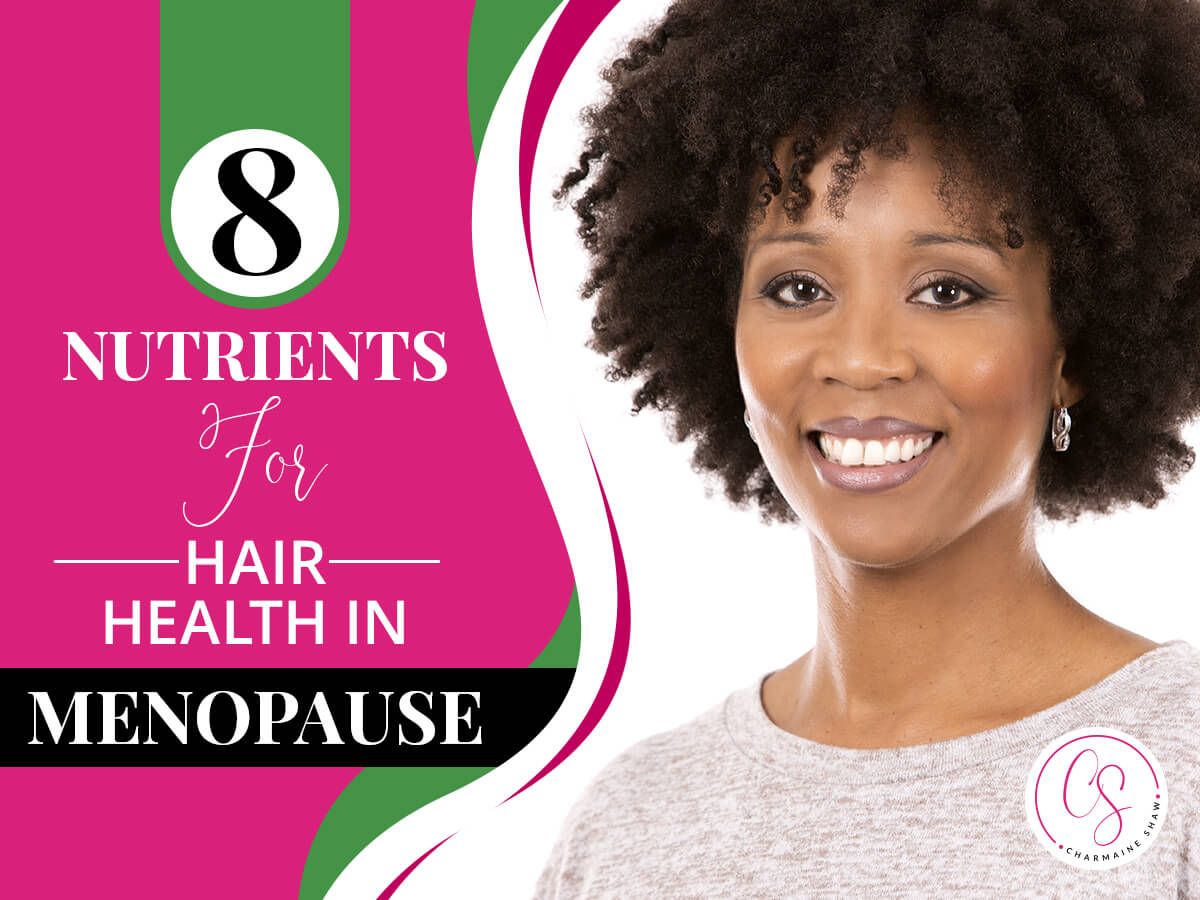Along with the physical and emotional discomforts and distress in menopause the changes in Estrogen in particular can impact your appearance. From thinning hair, wrinkled skin and vaginal dryness, you can’t avoid the normal effects of hormonal changes and aging but you are not without solutions to reduce and even change some of these issues.
Hair Health Fixes and Tips
Have you noticed thinning of your hair? Most women notice a loss of volume and length of during the time of menopause. This is because of the falling levels of estrogens. Estrogen keeps your hair in the growing (anagen) phase for a longer duration allowing it to be thicker, fuller and longer as it grows. But, when menopause arrives and the estrogen levels fall, the time hair stay in this phase reduces.
Here are eight key nutrients for menopause hair health:
Keratin –
Include foods into your daily diet that have nutrients which act as precursors to the keratin protein; the key element that makes up your hair. These along with other nutrients help the body manufacture new hair while nourishing existing hair, as well as aiding in hormonal balance. Some foods to include that can boost keratin levels include:
• Sweet potatoes
• Quinoa
• Sunflower seeds
• Kale
• Mango
• Garlic
Iron –
Add iron to your diet by including foods that are rich in iron like beets, almonds and spinach. Iron helps carry oxygen to hair roots, which stimulates growth, and is especially important around the age of menopause as our nutrient needs increase. Some iron supplements like Floradix are natural sources of iron along with B vitamins to help keep iron levels healthy.
Essential Fatty Acids –
Essential fatty acids (EFAs) nourish hair, prevent hair fall-out and can help your body replace nutrients that are important for healthy, shiny hair. Include foods such as avocadoes and olive oil. Foods like flax seeds, chia seeds and walnuts contain omega 3 fatty acids for a healthy scalp and a good dose of antioxidants to protect your scalp from free radicals that can damage hair. Daily EFA supplements can be included in your health regimen, if you feel your diet doesn’t provide enough.
Bladderwrack –
Herbs like bladderwrack support thyroid function, helping an underactive thyroid produce more thyroid hormones that keep hair healthy. Bladderwrack is a seaweed that has been used in traditional medicines for thousands of years. It is often found in thyroid supplements because it is an excellent source of natural iodine, which is necessary for thyroid health.
Biotin is another name for B7 and is a vitamin that supports the keratin infrastructure of your hair. In fact, studies show that supplementing with biotin promotes hair growth along with improvement in hair volume and thickness. (1)
Niacin, also called vitamin B3, is another helpful vitamin for hair growth. Because this vitamin is water-soluble, your body cannot store it, so it is important to include foods or a supplement that will ensure you get your daily dose. Some foods with B3 include green peas, avocados and mushrooms. Since you need 14 to 16 grams a day, a niacin supplement is also beneficial.
Vitamin C can prevent hair loss and stimulate production of collagen, which is also important to hair structure and strength. It can help you absorb iron and reduce damage from free radicals, which can affect hair and may even accelerate the aging process. Vitamin C is also a water-soluble vitamin, so include plenty of foods like citrus fruits, bell peppers, brussels sprouts, cabbage and tomatoes.
Coconut Oil – Coconut oil can be used to stimulate hair growth and improve the health of your hair. Some hair conditioners contain it, or you can apply it yourself. Make a hair mask using about 4 tablespoons of organic coconut oil mixed with 10 to 20 drops of the essential oil, rosemary and massage onto your hair. Wear a shower cap and relax for 30-60 minutes then shampoo your hair. You also apply straight coconut oil as an after-wash serum and leave it in until your next shampoo to add shine and let the nutrients soak in.
Get support: Navigating menopause or making changes can be overwhelming. Schedule a Free Consultation to see how my coaching can help or jump over to the online programs here and take the first step to reclaim your body, health and life.

References
Glynis A. A Double-blind, Placebo-controlled Study Evaluating the Efficacy of an Oral Supplement in Women with Self-perceived Thinning Hair. J Clin Aesthet Dermatol. 2012;5(11):28-34.
Please Note: The information presented here is for informational and educational purposes only and is not intended to be used as medical advice. Any statements or claims about the possible health benefits conferred by any products or lifestyle changes have not been evaluated by medical professionals or the Food & Drug Administration and are not intended to diagnose, treat, cure, or prevent any disease. You should consult your health practitioner before changing your diet, taking supplements, or starting any exercise or health program.

